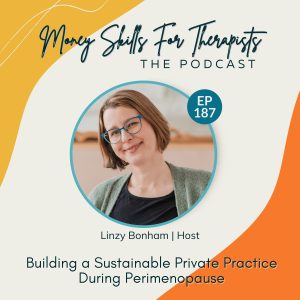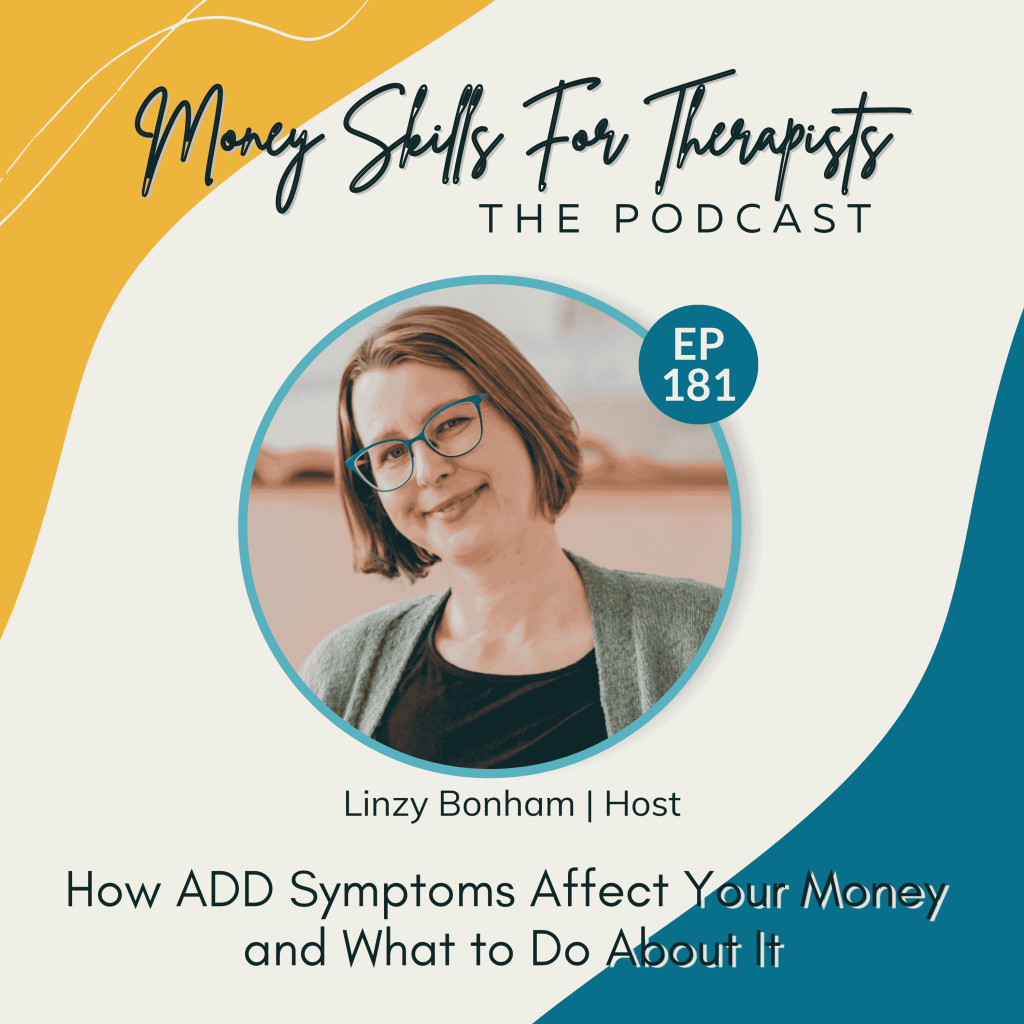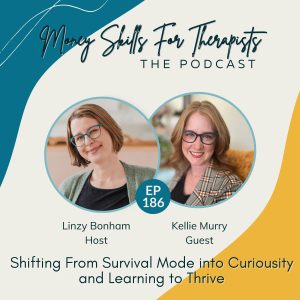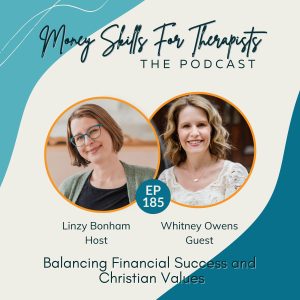00:00:00 – Linzy Bonham
This is what I see happen is women in their 30s and 40s, sometimes 50s, realizing that, you know, this and this and this in their life. All these disparate challenges that seemed unconnected all come back to symptoms of add. So let’s talk about why ADD makes money so much harder. All of it really comes back to the fact that ADD is a challenge with executive finance functioning. Welcome to Money Skills for Therapists, the podcast that helps therapists and health practitioners in private practice go from money confusion and shame to calm clarity and confidence with their finances.
00:00:38 – Linzy Bonham
If you’ve ever felt overwhelmed by numbers or avoided looking at your business money, you’re in the right place. I’m Linzy Bonham, therapist turned money coach and creator of Money Skills for Therapists. Before we jump in, check out my free on Demand masterclass. You’ll find the link in the show notes or@moneynutsandbolts.com under masterclass. It’s the best first step to finally feeling empowered with money in your private practice. Let’s get started. Hello and welcome back to the podcast. Today I am recording a solo episode for you about ADD and money. We’re gonna talk about how ADD impacts managing money and what you can do about it if you’re somebody who has identified that you have ADD or suspects that you have add. And we’ll talk about that in a moment in Money Skills for Therapists and Money Skills for Group Practice Owners.
00:01:28 – Linzy Bonham
In the last couple years, I have had this surge of students who have had recent ADD diagnoses. These are usually women, usually being diagnosed in their late 30s or in their 40s. I can think of a few students, too, who were therapists I worked with way back at the beginning of Running Money Skills for therapists back in 2018, who, in the intervening time, you know, before we worked together again more recently in a group practice course, had been diagnosed with add.
00:01:56 – Linzy Bonham
So a lot of folks, I think, who are looking for support around money may have ADD as part of the picture. Right? Because ADD makes money hard. There’s also this missed generation of women who weren’t identified as having ADD going through school. Adhd, of course, is the actual clinical diagnosis. I’m going to use the term ADD here because that’s how I generally see it presenting for folks. There’s this MIS generation of women with ADD who were not identified back when schools started to identify young boys with add in the 90s. And I remember, you know, my brother was part of that kind of wave of them being able to start to identify and, and support Kids with these behaviors. We know that girls with ADD don’t tend to show that hyperactivity. They are like low H or no H, which means that they’re not acting out in the classroom, they’re not identified by teachers, and a lot of what they’re experiencing is internal. And you can end up going through decades of your life before you realize that ADD is what’s happening for you. And this is what I see happen is women in their 30s and 40s, sometimes 50s, realizing that, you know, this and this and this in their life.
00:03:12 – Linzy Bonham
All these disparate challenges that seemed unconnected all come back to symptoms of add. So let’s talk about why ADD makes money so much harder. All of it really comes back to the fact that ADD is a challenge with executive functioning. So all of the main hallmarks of add, and I’m not an ADD expert, to be clear, but all the main hallmarks that I’m aware of impact your ability to manage money.
00:03:41 – Linzy Bonham
So, for instance, like that difficulty with focus and being able to keep your attention on something that’s not particularly interesting to you, that’s really difficult when it comes to money, because working on our finances and learning about money requires focus. You know, we need to be able to sit with that thing for a while, and that’s going to be more challenging if your brain already has trouble focusing on things that you know are not that interesting to you. Challenges with organization are another part that makes money much harder. Having an organized system when it comes to money really helps to ease and clarify what’s happening. And creating that kind of organization is more challenging, right, with the ADD brain. So there’s another point where it can be more challenging. Forgetfulness with add, you know, like getting absorbed into a task and forgetting what you’re doing, forgetting to do a daily task, missing things also relevant when it comes to money. You know, with money, we have these points that come up where things need to happen, you know, like quarterly remittances need to be made, bills need to be paid.
00:04:41 – Linzy Bonham
And having forgetfulness as part of your experience of your daily life is going to make money more challenging. Being easily distracted, of course, makes money harder. Especially, again, if money is not something that you find interesting, if it’s not the most interesting thing going on and something more interesting comes across, your attention, you know, your attention is probably going to easily go to that more interesting thing also, because money’s not always fun, and sometimes it’s uncomfortable and hard to sit with.
00:05:08 – Linzy Bonham
And we’ll talk about that in a moment. Then there’s the piece of avoiding tasks that require mental effort. Especially when we are first learning about money and finances, it can be challenging. There is learning there to do. You are learning a new language. And learning a new language is always hardest at the beginning, where you’re starting to forge those brand new neuropathways that were not there before and understand okay, when I look at this, because of how this is organized, this is what this is telling me. The beginning of learning about money is so difficult. That kind of building your literacy when it comes to money takes time and it’s hard.
00:05:46 – Linzy Bonham
It requires mental effort. So that’s another point where one of those hallmark symptoms of ADD can get in your way when it comes to learning about money and getting to that place of being able to manage it. Well, the hyperactivity part of ADHD can also make it, of course, hard to sit still and do the work right. Like, money often requires actually, like sitting in one place. If you have a body that has a lot of energy in it and wants to move around, that’s gonna be challenging too.
00:06:15 – Linzy Bonham
And then impulsivity could lead to challenges in making grounded financial decisions. Since, you know, you make decisions on the fly without ever stopping to think about, like, does this make sense for you? Does this fit your bigger goals and values and plans? You know, that might be your intention, but if you have an impulsive part of you that comes with your add, overspending and impulsivity tend to go hand in hand. Right. We make fast decisions because something is interesting or fun or it feels like it’s going to fix something. And often those decisions in retrospect don’t actually turn out the way that we want. But that can really lead us to overspend and be spending money in ways that we don’t feel good about, which actually could then lead to this cycle of you don’t really want to look at your numbers because you don’t want to see what’s going on, because you’re not going to like what you see, which feeds into the need to avoid, which feeds into more anxiety.
00:07:00 – Linzy Bonham
So there’s a loop that forms there as well, which can also happen with folks who don’t have add, but can be that much more intense when you have maybe some impulsiveness in the mix and it’s already hard to sit down. Now you have a recipe for just like, avoiding it for the rest of time might feel quite tempting. So what can help you when it comes to ADD and money? I’m going to share what I have seen work for the therapists who have worked with me inside of Money skills for therapists and money Skills for group practice owners. And there are four things that I’m going to talk about. There is body doubling and CO regulation.
00:07:34 – Linzy Bonham
That’s one thing. Creating set times to do the work, automation and delegation. So let’s get into each of those things. First of all, body doubling and CO regulation, it can be very challenging to make yourself do something that you don’t really want to do, right? Especially something that’s going to require that mental effort that we were just talking about that is going to possibly bring up emotions that are gonna be unpleasant to sit with, maybe like guilt or shame or fear. You know, like these are emotions that none of us wants to just like willingly dive into on a daily basis.
00:08:07 – Linzy Bonham
And it’s gonna be that much more tempting to avoid them because of all the pieces we just talked about. So using that power of CO regulation can be huge to make you do things that you’d otherwise avoid. The way that I tend to see this work really well with folks is either by being part of a group where there is the, the group atmosphere, like there’s a group co working. So for instance, in money skills for therapists we have group co working calls where it’s like you can go and you can plug yourself into that group. You know that you’re going to go at this certain time and during that time you’re going to be able to do the work. You’re going to be with other people who are also doing the work, you’re going to see them, your nervous system is going to be able to attune into their nervous system to keep you focused and on track.
00:08:48 – Linzy Bonham
And in that group context, with a set period of time, you know, there’s a container there, you can plug yourself in to that to get yourself going on doing the work. The other thing that I’ve seen work really well is accountability buddies for body doubling and co regulation. So having a good friend, a good colleague who you can be accountable to in terms of specifically finances. And this is something that we do for folks both in money Skills for therapists and money skills circuit practice owners as we offer accountability buddy matching.
00:09:18 – Linzy Bonham
Because having that more intimate personal relationship with somebody you know and being able to share with them why it’s worth it for you to learn these skills, why it’s worth it for you to be doing this work, getting to know them, getting to know each other’s goals, cheering each other on, and then also being able to sit down and cowork and check in and be like, hey, you know, how did that hard conversation at the bank go? Did you do it? What is your decision? What are you doing next? Or, you know, did you have that hard conversation with a team member? If you’re a group practice owner, having somebody to check in with to help you keep doing the work and help you keep doing the things you don’t want to do and even just to sit down and do your regular finances with can be a way to make something happen that otherwise, left to your own devices, might feel absolutely impossible.
00:10:01 – Linzy Bonham
Another piece that fits with that, but is a slightly different aspect of it is creating set times to do the work right? If you don’t make working on your finances and working on your group practice finances something you don’t want to make working on your group practice finances something that you’re going to have to just find time to fit in somewhere, because if it’s not compelling to you, if it’s not interesting, it’s likely never going to rise to the top of your to do list until there’s some sort of crisis, right? Until the situation is dire, until you’re right down to the wire and it’s like tax time and now you have 10 months of stuff to catch up on or 12 months of stuff to catch up on.
00:10:36 – Linzy Bonham
Add generally, and I see this in my own relationship with my spouse who has addicted to is, it can often be very hard to make yourself do something until it’s absolutely.
00:10:47 – Linzy Bonham
There’s no time to hesitate anymore. You’re down to like the last minute. And that’s a really stressful way to engage with money because then you’re only ever touching your money at a time where basically now things are kind of on fire or about to fall apart, which of course is not going to give you a positive relationship, not going to make you want to work on it. Going to be a great reason to avoid again until a year from now when it’s tax time again. And then you’re in this terrible cycle, right? So getting those set times into your calendar. You know, in money skills for therapists, we call this money time. In the group practice course, we call this CFO time chief Financial officer. Because in a group practice, you’re going to have other large financial decisions that you’re going to be making and other pieces that are going to be part of this work with a more complex business, having that set in your calendar so you don’t have to make the active decision on any given day that it’s time to work on your money, but it’s already there. Takes away that need to make a decision and then it’s about making sure that you actually have the supports to follow the plan.
00:11:44 – Linzy Bonham
So probably a combination of having set times to do the work and some body doubling, co regulation, accountability is what I see most helpful for most people with ADD is that combo, right? We don’t want you to have to make fresh decisions all the time. When it comes to money, decision fatigue with money is huge. You shouldn’t have to decide what day you’re gonna work on money. It should be a default that you work on it every Tuesday from 2 to 3, right? And then your accountability buddy can also be there. Or if you can check in with them afterwards, or if you can plug yourself into a co working call with a bunch of people, that’s going to make it that much easier to go follow through on what you’ve actually promised to yourself because it feels good to seeing yourself also do the things that you’ve told yourself you’re going to do.
00:12:24 – Linzy Bonham
The last two pieces here, automation and delegation certainly go hand in hand. They’re two ways to kind of solve the same problem. Talk about automation. First, this is where I sometimes see the perfectionism of therapists and maybe a little bit of like the shame based idea that people like need to be doing this all themselves to like atone for lost time can really get in their way, right? We can really get this idea in our head that we need to be doing it manually, we need to be touching everything.
00:12:54 – Linzy Bonham
We need to understand how every little thing works. And it is important to understand how money works. But automation is also your friend, right? Let the robots help you. Since executive functioning, that ability to stop and organize yourself, to focus on the things that you’re not really that interested in is a challenge. Creating automation in your financial systems as much as possible is a gift to yourself, right? Like using a banking system like Relay, for instance, that allows you to have those profit first accounts. And this is only for Americans, unfortunately. But for Americans, you know, using a bank like Relay that has those automatic profit first accounts, if that’s a system you’re using and lets you automate the transfers.
00:13:31 – Linzy Bonham
And I’ve helped people set this up before where it’s like, okay, Every Tuesday at 10am the money’s gonna be divided up along these percentages and then it’s just being done. And you don’t have to stop on Tuesday and remember that you have to go and do your transfers because between like forgetfulness and the challenge with Focusing, you’re kind of setting yourself up for a challenge that doesn’t need to be there if it could be automated instead. So finding automations in your systems, having it so that bills are paid automatically. For instance, you’ve got your credit card on file with all your major bills. You are as much as possible taking that need to sit down and remember to do a task off your plate. It’s not making your life better for you to do that yourself. So automating those pieces is just going to save you so much bandwidth that really is way better serving you somewhere else. Delegation is automation’s cousin that involves humans, right? So you are never going to be the king or queen of executive functioning, right? Nor should you be.
00:14:30 – Linzy Bonham
This is not how your brain works. So bring someone onto your team who just loves this shit. Like you never have to do this alone. A good VA in your business is worth their weight in gold. And asking someone to help you in your solo practice or in your group practice with some key financial tasks or having a bookkeeper doing your monthly finances, it allows someone who loves order and loves making things like tidy bring their magic to your business and make that happen in your business while you focus on doing your own magic in the other areas of the business that you thrive.
00:15:03 – Linzy Bonham
Your therapeutic magic, your leadership, all the other cool shit that you’re making using your creativity and your vision. That is where your energy is best served to not in doing a bunch of tasks that you hate. Now. You can never give away the financial leadership part of your business.
00:15:19 – Linzy Bonham
You are always going to have to be that person who looks at the big picture, decides what his values aligned for the business, makes the big decisions, maybe makes the hard decisions. You can never give away the financial leadership of your business that is yours. But you can give away these menial little tasks that to you are going to feel boring and maybe meaningless that somebody else is actually gonna really enjoy doing. There’s people who really thrive on creating order out of chaos. They just like love it. And pairing with one of those people, bringing one of those people into your business is a gift for both of you because they get to do what they love to do and create order. And you get to benefit from that without trying to bend your brain into a bunch of shapes that are just really not how your brain works.
00:16:09 – Linzy Bonham
You’re always going to be responsible for those big picture decisions, but you can leave those little financial tasks to someone else. So to do a quick review of those four pieces that I found helpful for folks with ADD to help them with money. The first one was that body doubling and co regulation. The second one was that creating that set time to do the work.
00:16:29 – Linzy Bonham
The third was automation. And the fourth was delegation. And when you get the right combination of those things working in your private practice, helping you with your finances, this thing that can feel overwhelming and kind of the opposite of what your brain wants to do can become much more neutral or even positive, right? The more that you can take away the tasks that make it feel like your brain doesn’t work well because you’re asking your brain to do something that is just not what it’s naturally good at, the more you can take those away, the more you can build systems and supports and bring in help to take care of those things, the more you can show up and shine and in your business and in your life in the ways that your gifts allow you to do right? And with add, I will say I spend my life surrounded by folks with add.
00:17:16 – Linzy Bonham
It is a great counter to my kind of personality, which tends to be more maybe overly grounded, maybe a little overly serious. Maybe sometimes I get a little sad if left to my own devices. So I tend to be surrounded in my life with folks with ADD because they’re sparky and smart and spontaneous. They make really cool shit happen that I would never think to do. And so lean into those strengths in yourself. Don’t feel like you have to be somebody else. Don’t feel like you have to make your brain do things that it can’t do. It’s putting the right supports in place so that you can take care of the money, so the money can take care of you while you do the amazing things that you do in this world.
00:17:56 – Linzy Bonham
Thanks so much for joining me today. I’m Linzy Bonham, therapist turned money coach and creator of Money Skills for Therapists. If you’re ready to go from money confusion and shame to feeling clear and empowered, my Free On Demand Masterclass is the best place to start. You’ll learn my four step framework to get your private practice finances finally working for you. Register today using the link in the show notes or go to moneynutsandbolts.com under masterclass. I look forward to supporting you.







